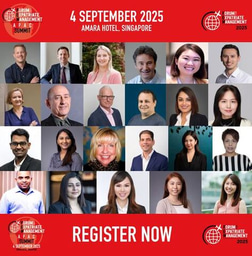Your APAC Online Summit questions on Developing and Optimizing Talent in APAC answered in full

If you missed any of the questions that our attendees put to the speakers on our opening panel discussion during our APAC Online Summit you can catch up here.
Jayne, Eva and Charlotte have kindly answered in further detail, questions that were submitted both prior to the event and during the broadcast of our discussion, September 9th.
Developing and Optimizing Talent in APAC
- Jayne Line, APAC Regional Head Talent Mobility Operations Strategy, Johnson & Johnson (Singapore)
- Eva Lu, Total Rewards Program Lead, APAC, Cargill Investments (China)
- Charlotte Stevenson, Global Talent Officer, Australian Government (Canberra, Australia)
Moderated by Claire Tennant-Scull, FEM's Global Director of Content & Events
Q&As:
Q. Under Covid, how is APAC handling cross border travel and commuter assignments?
Eva Lu: At Cargill, employees’ safety is a top priority and one of our core values is Putting People First. We have formed a variety of Crisis Management teams (Corporate, Region and Country) to provide guidelines and instructions to support the businesses and regions while ensuring the safety and health of our employees and customers. Cross-border travels and commuter assignments continue during the Covid if they meet essential business needs and are technically possible. Global Mobility at Cargill plays a pivotal role in partnership with the different expert internal and external groups and provides mobility solutions/recommendations to the businesses by complying with the corporate guidelines and local regulations.
Jayne Line: J&J has a similar approach to Cargill in that we are putting our employees and their families at the centre and ensuring any relocation decisions are aligned to our Credo. We set up a global squad when COVID hit and quickly put together a set of operational guidelines to support anyone stranded at that time. Through daily calls we were quickly able to support employees who were caught in the middle – these guidelines helped with compensation/promotion queries, corporate tax concerns, healthcare coverage flexible work arrangements and immigration changes.
Many companies including J&J are offering temporary remote working for scenarios where relocation is currently not possible for either immigration/logistical or personal reasons. At J&J relocations are proceeding on a case by case basis based on the destination country with a readiness check put in place. We are reassuring the employee and their people leaders that Credo-based decisions are being made, putting the health and safety of our employees and their families first.
This checklist will assess the following (but is not limited to):
- Employee Immigration Compliance in the destination country
- Employee/Family comfort/ willingness
- Social Distancing restrictions can be followed
- Availability of relocation services/logistics including Flights, Housing, Schooling, Shipment of goods, etc.
Charlotte Stevenson: I can comment on the Australian Government’s cross border movement policy at the moment. Currently we have strict border measures in place to protect the health of the Australian community. Very limited flights are currently available to and from Australia and you may not be able to travel at this time. At the moment, you cannot come to Australia unless you are in an exempt category or you have been granted an individual exemption to the current travel restrictions.
There are travel exemption processes in place to ensure those in critical sectors and with critical skills are still able to travel where appropriate.
You can find more information here:
- https://covid19.homeaffairs.gov.au/travel-restrictions-0
- https://travel-exemptions.homeaffairs.gov.au/tep
Q. How do you see the expat role changing after the pandemic?
Eva Lu: It might be too early to provide some concrete insights on the changes to expect in the expat role post Covid as many countries are still struggling with the difficulties. However, we’re confident that Global Mobility programs are one of the key enablers to develop our talent in the APAC region and fulfil the strategic businesses intent. We will continue to support international moves with necessary review and enhancements in our strategy, principles, programs design, processes, technology and services.
Jayne Line: I think it’s too early to say what will change with regards to the expat role. Over the years we have seen a lot less typical expat type relocations. I think the demand for a global experience still remains high on the agenda for many employees and for J&J it will still remain critical to develop global leaders. In addition to meeting local business needs, global assignments serve to transfer key skills and expertise across regions, develop leaders with an international business and cultural perspective, and cultivate broader, richer global cultures within J&J companies worldwide.
Due to current restrictions COVID will change how many “expats” or globally mobile employees think about cross-border moves. They will need to carefully evaluate whether a global experience is right for their family at this time given the risk of future lock-downs and travel restrictions.
Q. With virtual collaboration reaching another level will corporate relocations disappear? Or will it allow us to embrace global talent where ever they live changing the demands on employee benefits and regulations completely?
Eva Lu: We don’t think the corporate relocations will discontinue, but some changes are being anticipated in the management of talent mobility. Our businesses are still eager to leverage the Global Mobility programs. On the other hand, we’re exploring the innovative options to offer the career and development opportunities e.g. virtual assignment.
Jayne Line: I think we need to be cautious about virtual collaborations as a substitute for assignments – we see a lot of companies talking about being able to work from anywhere for any length of time – in reality this isn’t so simple - they are many considerations to factor in – time-zones, compensation, corporate tax implications, ability to work virtually and also the experience of being fully immersed within a new environment/culture etc will be missing so only time will tell if it’s still possible to develop global leadership skills virtually
Q. How do you handle repatriation from high salary/low tax location to low salary/standard of living and keep talent onboard?
Eva Lu: This is already a challenging scenario. We’re using a proactive approach in the career planning of the assignees throughout their assignments, including regular conversations with the businesses to review the progress of the assignment goals achievement of the assignees, and determine the next roles for the assignees after the end of the current assignments. We also improve our assignee selection process in partnership with our Talent COE/Business HR Partners to ensure the right people are selected for the right assignment opportunities at the right time with a very clear expectations on what should be accomplished through the assignments prior to the assignment. Also, we leverage the assignment package briefing session to manage the expectations of the assignees and explain the potential implications from a comp package point of view before, during and after the assignments.
Jayne Line: This does pose challenges but often solutions can be found – it will depend on the purpose of the move and how it fits into an employee’s overall career plan. If talent is required to fill a critical business need then the policy selected will have address this – on the other hand if the request to move is personal in nature then any compensation should be fair and equitably aligned to other employees in that location
Q. Has the strategy changed in the current climate, or are you still looking to the pre-COVID strategy?
Eva Lu: We’re reviewing our strategy and the goal is to have a more integrated Talent and Global Mobility strategy at Cargill. Though the initial driver of this strategy review was not Covid, the current fluid and changing conditions have provided us with the input and required us to incorporate the learnings from the Covid into the review of our strategy. In the new strategy where we intent to create more synergies and ties between Talent and Global Mobility, one of the principles is we want to be more aggressive in developing and growing our Asian talented people for larger responsibilities and critical regional/global roles through our Global Mobility programs.
Q. How does J&J design Talent Strategy for Global Mobility, and what are the key and core talent strategies?
Global moves form an important part of J&Js business and talent strategy. We believe that by developing a robust and diverse pipeline of global leaders we can ensure business continuity and growth.
There are 4 key strategic intents for J&J long term assignments; skill need (filling gaps in local markets), project (specialised skills that are not available at the host location), accelerate development (build future skills for leadership roles), strategic business governance (bringing in corporate values/systems to a certain location)
Q. What are the additional offerings included in the mobility program to attract and bring the talent to APAC during pandemic?
Eva Lu: Cargill releases a few policy changes to provide additional financial support to our mobile population and their accompanying families during the mandatory quarantine period including paying for the temporary accommodation, testing and per diem (daily allowance), with a retroactive effective date back to March 2020 through the end of May 2021 (the completion of Cargill’s FY21 fiscal year). Furthermore, we also review individual conditions to determine if more support would be required on the travel, immigration, and / or other services.
Jayne Line: Our policy is fully comprehensive so we are currently not offering any additional incentives unless there is a specific business or personal need.
Charlotte Stevenson: In order to attract high yield businesses and global talent into Australia, the Government recently launched (on 4 September 2020) the Global Business and Talent Attraction Taskforce. The Taskforce offers a coordinated whole of nation suite of services and a streamlined pathway to permanent residency for exceptionally talented individuals and successful businesses interested in growing their success in Australia.
More information can be found here: https://www.homeaffairs.gov.au/about-us/taskforces/global-business-and-talent-attraction-taskforce
Q. What are your thoughts on Virtual assignments as a tool to develop talent?
Eva Lu: We have a policy about virtual assignments applying to employees with home country jobs that require a regular and continuing pattern of cross-border movement. With the recent developments, we’re currently reviewing that policy and working on the enhancements in alignment with the new Talent and Global Mobility strategy.
Q. Is offering remote working solution not influencing whether a mobility assignment is actually necessary?
Eva Lu: Remote working is one type of the cross-border moves in our policy portfolio. The remote working arrangement applies to employees who perform the duties of a job that is located in a country that is different from the one where they live. We don't expect the remote working solution would completely replace the physical mobility assignment, however the Covid did trigger the discussions on how we’d leverage all available options to customize our solution and better cater for the talent and business needs with the constraints in the current environment, and what are the opportunities to be more efficient in our program management in a long run.
Catch up with the video discussion here:
Developing and Optimizing Talent in APAC
Find out more about Jayne, Eva and Charlotte here:

Jayne is a well-known and respected global mobility leader, with deep experience in developing and executing mobility program strategies across multiple business sectors. Jayne has held roles both in-house (Kraft Foods, Unilever, Publicis, Facebook ) and at consultancies (Deloitte, Cartus) . With more than 19 years of accumulated mobility expertise, she has worked in London, Tokyo and Singapore and currently leads the APAC Talent Mobility Operations team at Johnson & Johnson, which encompasses people experience & executive mobility.

Eva has nearly 15 years of experience in multiple areas within Human Resources and Total Rewards which consists of Compensation, Global Mobility, Benefits. Eva currently holds the position of the Regional Total Rewards Lead at Cargill for the APAC region to provide Total Rewards expertise to the businesses, manage regional governance and lead/support in ensuring a complete understanding of Cargill Total Rewards purposes and practices in the region. Eva is based in Shanghai, China. Eva holds a bachelor’s degree in Engineering and a master’s degree in Management from Shanghai Jiao Tong University, in Shanghai, China.

Charlotte Stevenson is Australia’s Global Talent Officer responsible for the UK, Europe and Israel. Charlotte works in partnership with business and industry sectors, universities, employers and Australian government partners to identify top talent across the region, for migration to Australia via Australia’s Global Talent Program. A key aspect of this program is to identify innovative start-ups and scale-ups looking for expansion opportunities in the Asia-Pacific, as well as identifying highly skilled individuals looking to contribute to the Australian economy.







Please sign in or register for FREE
Sign in OR sign up to become a registered The Forum for Expatriate Management website user
Subscribe here